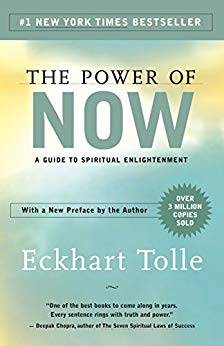

This article is an excerpt from the Shortform summary of "The Power of Now" by Eckhart Tolle. Shortform has the world's best summaries of books you should be reading.
Like this article? Sign up for a free trial here .
Do you often find yourself lost in thought, disconnected from what is happening in your immediate awareness? Do you live on autopilot?
Being constantly consumed in thought makes us unhappy and unfulfilled. The obvious solution is being present. According to spiritual teacher Eckhart Tolle, the key to living in the present moment is acceptance. When you accept the Now the way it is, your incessant thinking will subside as you’ll stop constantly wishing what could be, or ruminating about how things were.
In this article, we’re going to talk about how to stay in the present moment, and how it will impact your life.
Resisting the Present Creates Pain
Living in the present moment will not change your external circumstances. In fact, life consists of cycles of success and failure; each one is a necessary precedent of the other. These cycles can last from a few hours to years, and are part of the inevitable impermanence of everything in life. (There are also cycles of highs and lows when it comes to your physical energy, productivity, and creativity.)
When you are present, you must accept the lows as much as the highs as part of the reality of the Now. Why fight a cycle that is inevitable?
Much of the pain you experience is self-inflicted because you’re not accepting the reality of the present moment. The circumstances of your life — your “life situation” — can be unpleasant, but begrudging them does nothing to change the situation. When you resist the Now you are only creating negativity and unhappiness for yourself.
- Negativity manifests as irritation, anger, depression, despair, and resentment.
- This resistance even creates physical tension in your body. (e.g. Do you ever feel stiffness in your back and shoulders from stress? Or clench your jaw or grind your teeth without realizing it?)
When you feel resistance and negativity build in you, observe it. Put your attention on it, acknowledge it, and then drop it.
- If you can’t drop it, then accept it. Don’t resist it. Accept that you’re feeling this way, and avoid or judging or blaming yourself for that reaction.
- If you can’t drop it, you can also practice making yourself “transparent” to the irritation. Imagine the solidity of your body dissolving, and allow the irritant to pass right through you. Break down the “wall” inside you that the irritant (e.g. a loud noise, a rude comment, an inconvenient circumstance) is bumping up against, and let it pass through you.
It is true that external circumstances in your life can create challenges for you, but they are merely “situations” unless/until you start labeling them as “problems.” Rather than resisting the present because it can be unpleasant or painful, try to stop labeling things as good or bad and instead accept it as reality, as part of the cycle of highs and lows. Judging a present moment and circumstances as bad will make you want to resist it, which in itself will cause more pain. If you accept it as it is, then you can work with it (more on this later).
- Superficial changes can occur to seemingly improve your life, like winning the lottery. However, if you’re carrying pain from the past and don’t become more present in the Now, then you’ll still carry that pain into the future and will feel the same. You may have a bigger house, but you’ll still feel unfulfilled in it.
(Shortform note: It can be hard to make this argument to people who are dealing with real hardship. It might be more palatable to frame it by saying that presence and acceptance allow you to better deal with hardships, rather than succumb to them mentally and create added negativity around a situation you either can’t or haven’t yet changed. Presence, then, gives you more mental and psychological capacity to improve external challenges.)
Presence Requires Acceptance
If you are resisting some aspect of what exists in the Now, your focus is on how you wish the situation could be, or how it might improve later. You are not present. Presence requires accepting what is — or surrendering to the Now — without judgment. (We’ll talk more about surrender in the next section.)
Examples of judgment are thinking, “I wish I were doing something besides working on this report right now,” or “I can’t believe I’m stuck in this long line at the post office.”
Even judging something as good (e.g. “I’m having a great day” or “This is going to be my best work yet”) creates a mindset of classifying things as either good or bad.
- We have a limited understanding of what is truly good and bad. Often, awakenings and forgiveness come only through pain and suffering first; the seemingly negative ultimately results in a positive (what some call a “blessing in disguise”).
- This is reinforced in the Bible’s Book of Genesis, where Adam and Eve were not allowed to stay in “paradise” once they “ate the tree of the knowledge of good and evil.”
Acceptance and presence are the only way to get through a difficult (or any) situation in life. You can’t go around it (avoidance) or go backward (time travel), so you must go through it, moment by moment.
Engaging only with each moment — and not with the past and future — allows you to break down problems to a more manageable size. When you isolate problems to just the present moment, you start to see that most problems only exist in the context of time.
- (Shortform example: You are stressed about your pile of bills. These bills are due in the future. Granted, you can’t pretend like they don’t exist and delay action until your electricity is being cut. However, you can make a plan to budget your expenses or take on some extra shifts at work to make ends meet. Then, accept that there is no more that you can do in this moment. Recognize that your worry and stress are doing nothing to pay down your balance, only making you unhappy and potentially pulling your energy away from productive action (more on this later).)
You may find clarity and context by asking yourself, “If everything stayed the way it is at this exact moment, would I be OK?” (Shortform note: You can relate this to the adage, “This too shall pass.” If you’re only taking life moment by moment, nothing is beyond what you can handle.)
Imagine you are walking along a path while it is pitch dark and very foggy, but you have a flashlight that illuminates enough space in front of you that you can make your way forward.
- The fog is your life situation, including the past and future.
- The flashlight is your presence.
- The illuminated space in front of you is the Now.
Surrender Is the First Step to Taking Productive Action
Many people have a negative connotation of surrender, associating it with passively tolerating a situation without taking further action. However, surrendering to the Now means to stop fighting the flow of life and to accept the reality of the Now; only then can you take productive, positive action forward.
In any undesirable situation you have three choices:
- Change the situation (if you can).
- Leave the situation (if you can).
- If you can’t do either of the above, accept it as it is.
Change or Leave the Situation
These first two options involve action. Any action is typically better than none — either it improves the situation, or it is a mistake that you learn from, which is still ultimately benefiting you.
If you’re resisting taking action, ask yourself whether it’s out of fear. If so, observe the fear and be present with it; don’t judge or analyze it. Once you’ve acknowledged and accepted that fear, then you can decide your best next step.
There may be something you could do but aren’t doing, perhaps out of laziness. If this is the case, decide whether you are going to take action, or accept and embrace your laziness.
- If you decide to continue on your course of inaction, you are better off committing fully to that choice than failing to act and then berating yourself or feeling guilty about it. Making the choice not to act and then feeling bad about it is manufacturing a problem and creating unnecessary pain and negativity for yourself.
- (Shortform example: If you are unhappy about your job, you can either change it (try to get a promotion or adjust your work duties), leave it (find a new job), or accept it as it is. In most cases, you probably have the option to change or leave your job. But if you don’t have the time, energy, or motivation to apply to new jobs or talk to your supervisor about making changes, then stop complaining about it. Going into work every day thinking about how much you hate your job only weighs you down with negativity.)
Accepting the Situation
If you can’t change or leave a situation, you may be forced to accept it forever, or at least until things change and you can take another action later.
If you are in an unpleasant or undesirable life situation, your first step is to acknowledge and accept the reality of this moment, because you can’t change what already exists in the Now. If you resist or deny the reality of the present, you’re stuck wishing it were something else. That not only creates pain and negative energy (as we discussed earlier), but also prevents you from being able to move forward or make change.
- (Shortform example: If life gives you lemons, and you dwell on how you wish they were oranges, you’re still sitting there with a pile of lemons. If you accept that lemons are what you have to work with, you can use your energy to come up with things you can do with them — like lemon bars, lemon meringue pie, or, of course, lemonade.)
Sometimes planning your next steps will be the only action you can take in the Now. If so, be careful not to get caught in mental projections of the future (psychological time). Instead of focusing on the myriad things you may have to do in the future, focus on the one thing you can do now, in each moment.
If there’s nothing you can do, surrender; accept it without resistance. Often you may find that circumstances change on their own, or as the book says, “Life becomes helpful and cooperative.” (Shortform note: This is comparable to the notion in The Alchemist that as you follow the call of the Universe, the Universe will help you on your path.)
Surrendering to Illness and Suffering
We have explained why you must surrender to both the good and the bad in life in order to be present and access inner peace, but dealing with money problems or a job you don’t like is one thing. How do you accept extreme situations like chronic illness or suffering? Although the circumstances are more difficult, the process is essentially the same.
Like life problems, illness needs the context of past and future to exist. In each isolated moment of the Now, you only experience symptoms — physical pain, weakness, discomfort, or disability — not the entire illness. Accepting an illness can be overwhelming, but if you surrender to the existence of symptoms, you can be present and transform your experience.
(Shortform example, if you deal with chronic migraines, you can choose to experience your migraine one of two ways.
- You can think, “Again?! This could last hours! Now my whole afternoon will be lost. And this is my third migraine this month. What am I going to do with these awful migraines plaguing me all the time?”
- You can accept the present pain (and potentially temporary disability, in cases of extreme sensitivity to light and noise), and focus on breathing and getting through each moment.
Surrendering to the present won’t make the migraine go away, but it will alter your experience of it.)
Do not surrender to the idea of illness. Since illness needs the context of past and future (otherwise it is reduced to symptoms), it engages your ego and takes you out of the present. Making an identity out of being sick does nothing to help you, it just keeps your focus on the unpleasantness and suffering.
Do not feel you’ve done anything wrong to cause your illness. Do not feel guilty for it, do not blame yourself. Also do not blame life for cursing you with it.
- Know that your illness has nothing to do with who you are. It does not define you in any way, despite what your ego tries to make you believe. Your true Being is unrelated to your physical body.
- (Shortform example, if you were to wake up tomorrow and find you were completely blind, would it change who you are? It would certainly affect how you experience the world, but it would not change your true self.)
If you find yourself feeling defensive or upset by this, reflect on whether you may have taken on this illness as part of your identity. If so, your ego may be reacting to this questioning of your supposed identity.
Sometimes reality is so painful — like when you lose a loved one — that it’s too difficult to accept initially. But you always have two chances at surrender.
- You can surrender to the circumstances of the Now, because you can’t change what already is.
- If you can’t surrender to the external, surrender to the internal. Surrender to the pain, grief, sadness, fear, or loneliness you are feeling. Allow yourself to feel this way without judging, analyzing, or pitying yourself.
Once you recognize and accept these negative emotions, you are less likely to blindly act on them.
- However, at some point you will need to stop creating this negativity; otherwise, your acceptance just becomes indulgence that allows you to carry on in this mental pattern.
- Don’t use temporary escapes — such as work, drugs, sex, alcohol, food, shopping, or any other short-term pleasure — to avoid the pain. If you do, the pain will be waiting for you, possibly more intensely, when that pleasure fades.
When you have accepted suffering, you have indirectly accepted death. In death, only your ego and physical body cease to exist; the energy of your true Being can never be destroyed. When you can be present through suffering and understand that your true Being is really separate from your mind and body, you can then accept that this part of you is unaffected by what happens to the physical and mental parts of you.
You can use pain, illness, and suffering to push you deep into presence and enlightenment. Through extreme circumstances and pain, you may find yourself in a position where you have nowhere else to turn but inward to finally find peace and enlightenment. We’ll discuss this more later.
———End of Preview———

Like what you just read? Read the rest of the world's best summary of "The Power of Now" at Shortform . Learn the book's critical concepts in 20 minutes or less .
Here's what you'll find in our full The Power of Now summary :
- Why you feel pain from the past, and how to get rid of it
- How to be more present and stop worrying about the future
- The 8 key ways to achieve mindfulness






